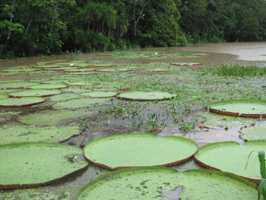Our cruise on the Amazon in Peru from which we recently returned (see Los Ribiernos 12 Mar 2012) falls generally in the category of adventure/eco-travel. There are many sub-categories as well, but suffice it to say that we tend to opt for the segment which is long on luxury and somewhat shorter on adventure with a nod to the ecological wonders of the world. We’ve done Antarctica, and our only real adventure was when I had level five seasickness while we were navigating the Drake Passage, and our time on the Yangtze river was punctuated only by our choice of whether to have one or two cocktails before dinner. We’ve done the safari thing in South Africa, checked out the Darwin Finches in the Islands of the Galapagos, trekked the rain forests of Costa Rico, been raptor watching in Turkey, and toured the slums of Delhi without ever giving a single thought to any untoward event occurring which might threaten our well being.
The drill is pretty much the same. You plan carefully, rely on organizations with established reputations, do what they tell you and enjoy yourself being a part of something that you weren’t designed to be a part of. On eco-cruises you luxuriate aboard a cruise ship with all the amenities and leave the ship in smaller groups aboard inflatable zodiacs or solid structured skiffs to pursue whatever flora and fauna the area provides. The smaller vessels are aways crewed by competent personnel who are familiar with the local environment if not with the english language. The equipment is well maintained, and safety equipment is always in evidence. You go out for two or three hours with the only worry being the endurance of your bladder. Generally there are several boats who move about in a small pack with one or two always in sight and radio contact. Occasionally the weather god will rear his ugly head and make you wish mightily for the succor of the mother ship’s bar, but it never lasts for long or is too rough.
We’d had several days of such excursions aboard the MS Aria on the Amazon and it’s tributaries. Some side trips starting as early as 6:30 am and some ending as late as 8:30 or 9:00 pm. The most significant adventure was when my bladder failed a longer morning excursion and the crew had to find a landing and clear a small WC area in the jungle. As I stepped ashore with some urgency, they called out, “watch out for snakes”. I did my business fully alert to the snake danger in record time, and we were off to complete the morning trip.
Our excursion for our fourth day aboard was characterized as a “full day trip” into the Picaya Samiria National Rreserve. The reserve is the second largest in the Amazon basin at twenty thousand square kilometers, most of which is under water much of the year. Our plan was to leave the Aria at the entrance and proceed by skiff to a ranger station about twenty five miles into the Reserve at which point we were going to be led on a short trek in the rain forest/swamp by a local from the ranger station, eat a catered lunch and return at leisure to the Aria checking out the monkey’s, birds, et al on the way back.
All proceeded according to plan. Our skiff was manned by a helmsman named Manuelo, Julio, the head guide, and on this trip we were accompanied by an additional crew member who served as paramedic and jack-of-all-trades whose name I never knew. A separate skiff with additional staff and provisions for lunch and second skiff with our fellow passengers made up our small armada. I had thought to wear shorts and a t-shirt but was thankfully dissuaded by Julio as we were beset by squadrons of very large, angry mosquitos as we poked along a ghost of a trail in the jungle. We crossed a small river to the ranger station and had a delightful lunch all the while thinking of the three to four hour trip back to the mother ship.
As we set off we were sidetracked by a small group of howler monkeys, an ever indolent three toed sloth, and a new bird here and there in the jungle canopy. The other boats had raced ahead evidently more anxious to return to the comforts of our home ship. We were moving downstream at a reasonable pace even with several short stops to inspect the local critters. I later calculated that we were averaging about eight miles an hour, and with a current of roughly two miles an hour we would have a trip home of about two and a half hours. That is, if the engine had continued working, which it didn’t. About one hour into our homeward journey it quit. Plonk!. No amount of coaxing could coax it beyond a feeble sputter. The helmsman poked at prodded the lifeless engine while Julio tried to raise someone, anyone, on the radio to no avail. The other skiffs were too far ahead and now out of sight as well as radio range. The VHF could not, as the marketing literature had promised, connect us to the Aria. We were adrift, out of contact, and a long, long way from anywhere.
S. and the other couple with whom we shared the skiff seemed to have little concern for our predicament, but I could tell by the tone and pitch of Julio’s voice as he tried and failed repeatedly to reach any one by radio that he was mucho concerned My navigating skills are non-existent, and my survival skills had been left behind at Ft. Benning forty five years ago, so I was officially worried. I figured we had travelled about ten miles, and with a current of two mph, it would take another seven hours or so to drift back to habitation if we didn’t get hung up in some crook in the river. It was then 2:30. Night fall was at 6:00. You see the problem.
Perhaps the mother ship would notice when we didn’t show up at a reasonable time, but perhaps they wouldn’t. Perhaps an express bus would come by, but I wasn’t counting on it. I asked Julio what his plan was and he replied, “no hablo englis” or something that sounded very much like that. I envisioned a night adrift in the jungle swamp. I envisioned pirates. I envisioned a giant anaconda slithering in the boat with us. I dreamed of a giant cheeseburger with a gin and tonic in the ship’s lounge. Frankly I was scared, but I didn’t quite know what I was afraid of.
And then I heard a faint putt, putt. We had not seen another boat all day, but this had to be one. Nothing was in sight, but I was sure it was only around the next bend, and it was. A small dugout with six of the areas finest filling the craft to its gunnels (ok, I don’t know what gunnels are, but it sounds right). One guy held the tiller while the other five did a passable imitation of three toed sloths. There was absolutely no movement or sound except the putt putt of the five horse power engine. They exhibited no surprise at seeing us but seemed to be maneuvering a wide swath around us. Julio was frozen. He made no motion to them and certainly didn’t call out for help. It was almost as if he didn’t want them around. I simultaneously waved my arms, gesturing for them to come to us and excitedly told Julio to ask them if they could tow us down stream. I said, we’ll pay them a reward for their trouble. Julio looked pained and muttered, “no dinero”. I said, “don’t worry about the dinero”.
The closer they got to us the less enthused I was about them. I began to think that they had no real reason to be where they were and they clearly didn’t have nine-five type jobs. In fact, they looked and acted completely indifferent to finding some gringos drifting down the river. I began to think that maybe this wasn’t a really great idea after all, even to the point of wondering what I might be able to use to defend ourselves if it came to that. A quick inventory of weapons came up short with only my life jacket, a broken paddle, and my new Leatherman all-purpose tool in the bottom of my back pack. Finally, some agreement was reluctantly reached between Julio and the local with the NYPD hat, and they lashed our boats together and began slowly chugging downstream. While digging in my backpack for the Leatherman, I found forty dollars stuck away in Sandra’s passport, and felt some comfort that we at least could pay them some ransom if they so demanded or reward if they finally tugged us to safety.
I figured that the combination of their small motor and the current was moving us downstream at about five mph and started to feel a little more comfortable with our predicament. My comfort evaporated as one of the locals decided to join us in our skiff. He did so without so much as a by your leave or whatever that would be in the local dialect. He said nothing but continued to glance furtively at us while holding a week old spanish language newspaper. I gripped my Leatherman a little more firmly and prayed for the radios to start working. After about an hour, the radios came to life with voices from the Aria. They were sending back-up skiffs for us and would be there in about an hour. It was a very long hour.
We were saved! The back-up skiffs arrived and we quickly gathered our belongings, including my trusty Leatherman, and climbed aboard a skiff with a working motor. I proffered the two twenties to the NYPD hat guy and he accepted with what vaguely sounded like “muchas gracias”. I gave him muchas, muchas gracias in return, and with a nod and a smile, they started back up stream.
I guess, it could have turned out differently. We could have continued to drift into night fall. The boat with locals might not have appeared. The locals might have been bad guys. But none of that happened, and we will have our small Amazon adventure to remember.



